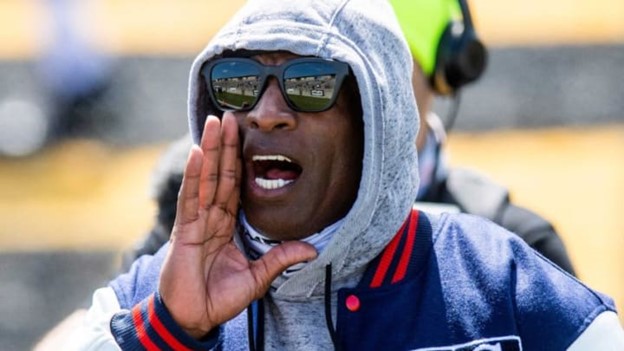Black History: Coach Prime’s impact on HBCUs

By DERON SNYDER (as published by USA Today)
By the time Jackson State University was founded in 1877, more than three dozen similar institutions already existed. By the time Deion Sanders became Jackson State’s head football coach, in 2020, the U.S. Department of Education had identified more than 100 such institutions – Historically Black Colleges and Universities.
HBCUs have produced some of the NFL’s greatest players, particularly from the 1950s and into the 1970s, when most Black athletes were prohibited from attending primarily white schools to play football. Legendary NFL halfback Walter Payton played at Jackson State in the Southwestern Athletic Conference. Other NFL Hall of Famers from SWAC schools include Jerry Rice (Mississippi Valley State), Buck Buchannon (Grambling State) Mel Blount (Southern) and Michael Strahan (Texas Southern), to name a few.
But as segregation was coming to an end, top Black high school players increasingly attended primarily white institutions, causing HBCU football to fade in prominence. Sanders immediately upset the status quo in December 2021 by signing Travis Hunter, the nation’s No. 1 recruit, who was slated to play at Sanders’ alma mater, Florida State. That was the initial wave of unprecedented media attention on Jackson State and “Coach Prime,” with heightened interest in HBCUs and racial reckoning still rippling through the nation after George Floyd’s murder in 2020.
Two years later, in 2022, Sanders left for Colorado – taking his sons Shedeur and Shilo Sanders with him, plus Hunter. The move sparked debate among HBCU advocates. Some felt betrayed by Sanders and worried that the gains in exposure, finances and recruiting would be short-lived without him. Others contended that HBCUs benefitted from the experience and can’t rely on one individual to promote the product.
“HBCUs are certainly better off,” says Dr. J. Kenyatta Cavil, a professor at Texas Southern who studies HBCU sports and culture. He points to the increased TV broadcasts, wider social media presence, and expanded coverage from various outlets. From a pure business perspective, he says Sanders and Jackson State/HBCUs pulled off a successful merger.
“HBCUs in a sporting context are a real brand that we can measure in a lot of ways,” Cavil says. “It carries its own weight. Then you have this individual, mega-unicorn superstar in Coach Prime. You’re getting metamorphic explosions that you’d see in any business when major brands come together to create one opportunity.”
Jackson State was 23-3 overall in Sanders’ last two seasons, 16-0 in SWAC play. His success and media magnetism drew coverage from TV programs that rarely thought twice about HBCUs, including “60 Minutes”, “Good Morning America”, and ESPN’s “College GameDay.” Sanders’ impact on cash registers – what Cavil coined “the Prime Effect” – was undeniable. Visit Jackson, the city’s marketing bureau, calculated a $30 million impact from JSU football in 2021, nearly double the 2019 estimate.
Sanders argued that HBCUs should receive bigger checks from Power 5 opponents for “money games,” and better compensation from local promoters for HBCU classics. He advocated for more NFL draftees from HBCUs and helped spark a combine that attracted evaluators from all 32 teams. He was the face of HBCU football for three seasons. But the week before his final game, he accepted Colorado’s offer, bumping his annual salary from $300,000 to $5.5 million.
“Most people I talk to feel he was an opportunist,” says veteran journalist Mark Gray, host and producer of the HBCU Sports Nation podcast. “He played the role of savior for the downtrodden and it worked to his advantage. HBCUs already had a rich tradition, a tremendous legacy. It was almost like he came along and sucked the life out of the room. And now he’s gone.”
During his second “60 Minutes” interview in two seasons, Sanders said “I left when I was supposed to leave. I finished the task.” When asked if he could’ve done more, he said “I think we did a tremendous job in Jackson. I think we laid down a tremendous blueprint.”
Curtis Symonds, a longtime TV executive and member of the Broadcasting Cable Hall of Fame, says Sanders “helped open a lot of people’s eyes on the value and integrity of HBCU sports.” Symonds is president and co-founder of HBCU Go, a streaming service launched in 2012 to carry sports and cultural content.
“I’ve been around this for over 20 years and raising awareness of Black college sports was hard,” he said, adding that business is still booming in Sanders’ wake. “I don’t see how anyone sees his time as a negative, or him leaving as betrayal,” Symonds says. “Every coach is looking for the next opportunity if it’s right and the money’s right.”
 Follow
Follow
